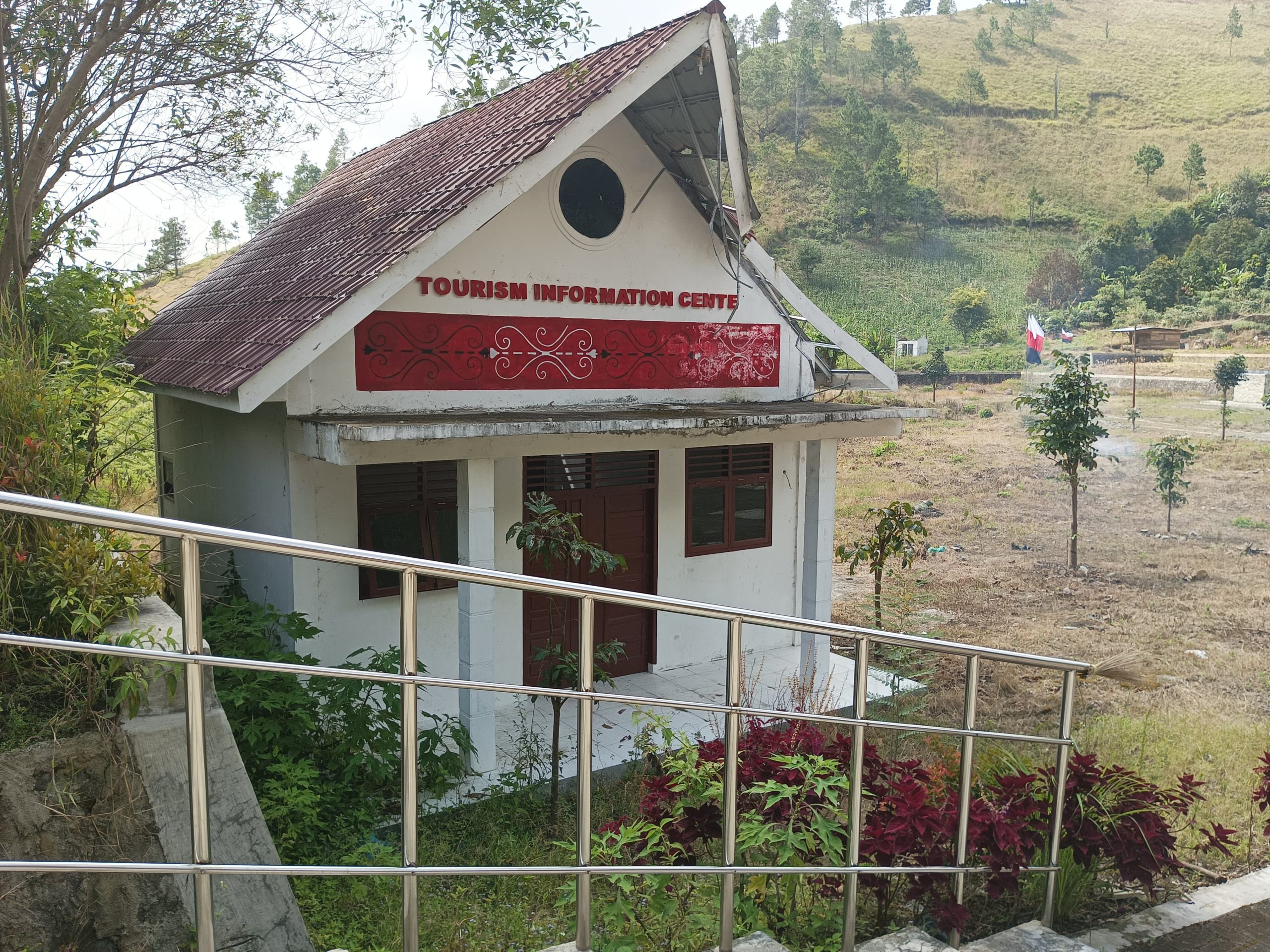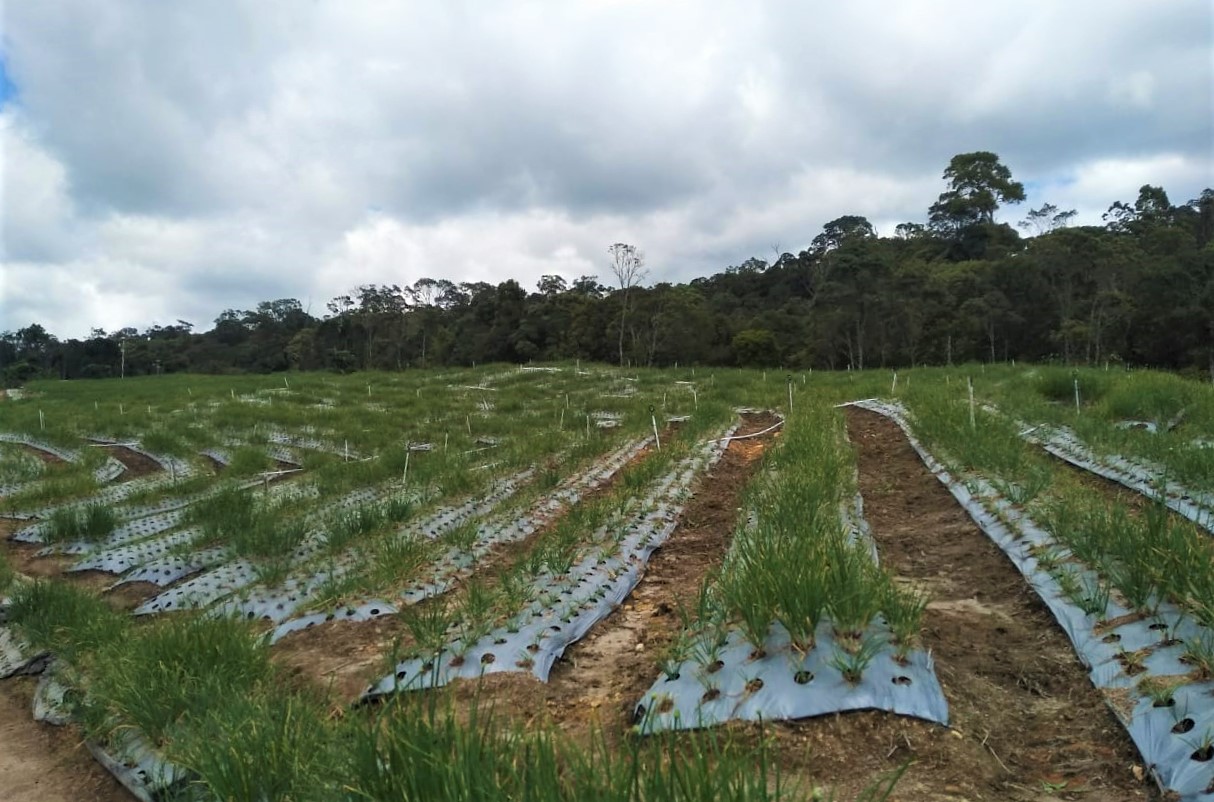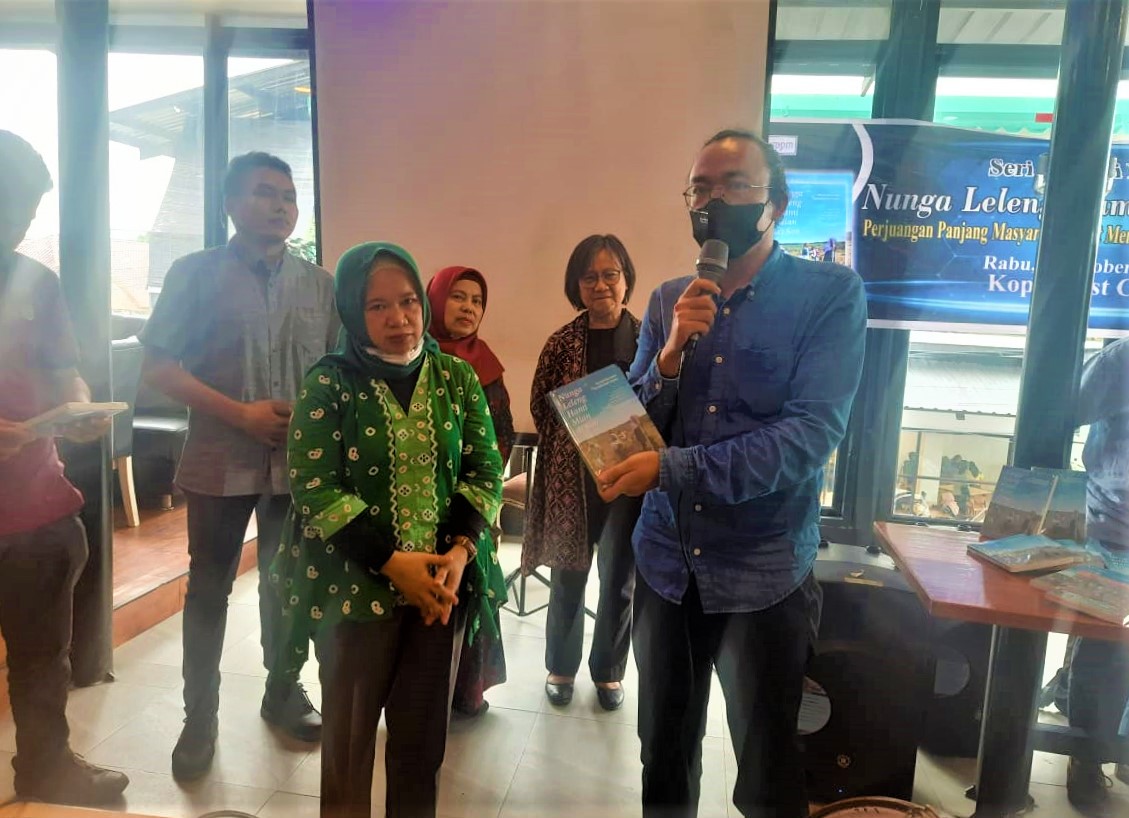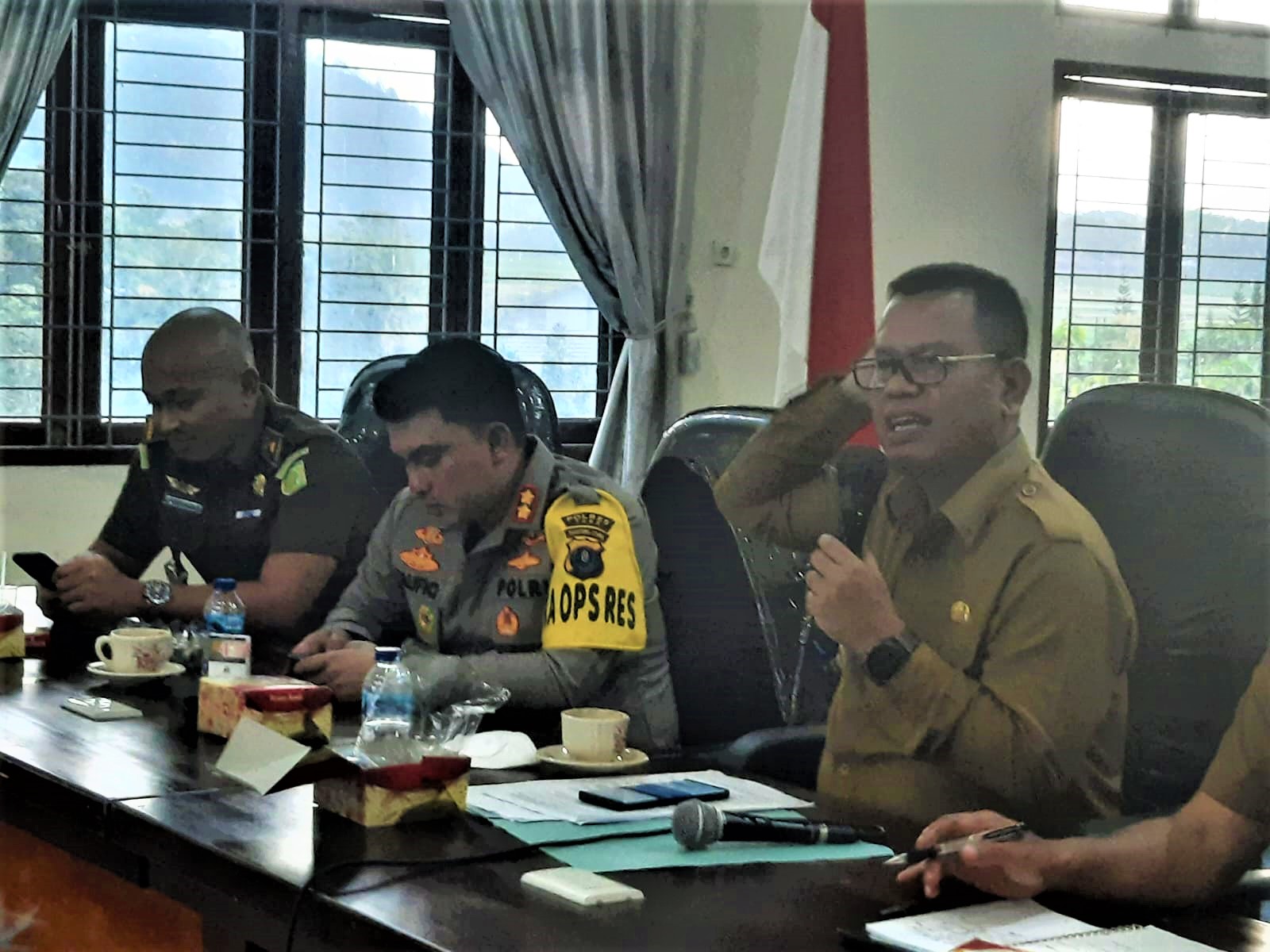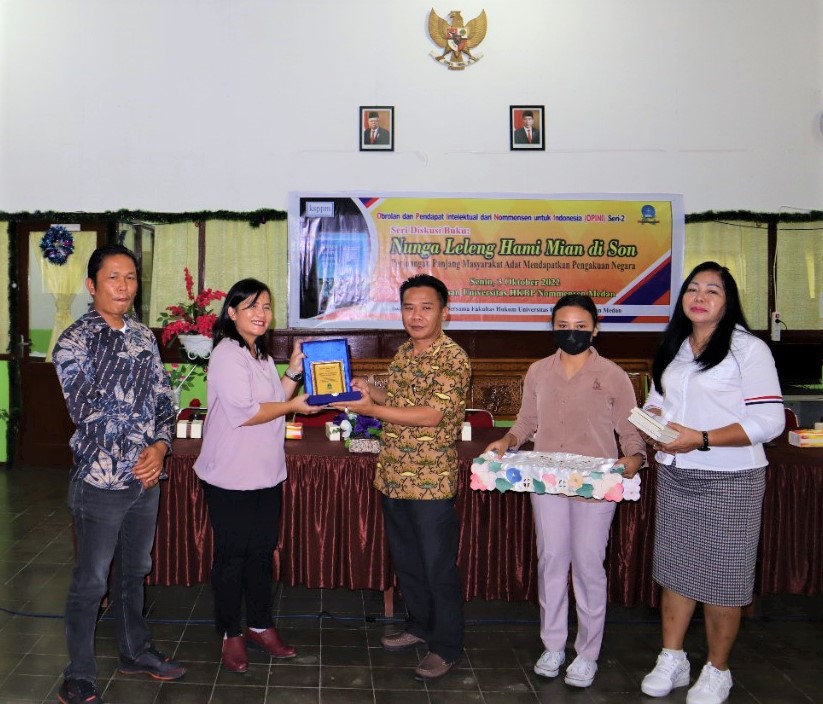The promise of international tourism development often contradicts the reality faced by the community. Although tourism development receives a large state budget, village infrastructure as the main access road to the village is far from decent conditions.
For the government, tourism is heralded as one of the sectors that most contributes to increasing state revenue. Wanting to emulate Bali tourism which greatly contributes to increasing the country’s foreign exchange, the government wants to make Lake Toba the new Bali.

Huta Ginjang Village Tourism
Caldera tourism in Huta Ginjang is managed by the Regional Government (Pemda) of North Tapanuli Regency. Visitor vehicles are charged a retribution fee and this is a source of income for the local government’s tourism office. Apart from the retribution, the local government has around 15 stalls that are rented out to the people of Huta Ginjang Village. However, from my observations, not all stalls are occupied and some are even closed for long periods.
According to Mrs. Aritonang, one of the vendors at Huta Ginjang Caldera, trading at this tourist site does not significantly improve the economy considering that visitors are also seasonal. Visitors are usually crowded only at the end of the year, the beginning of the year, and long weekends. He also said that visitors sometimes only come briefly for photos and then immediately leave without buying anything. He does not blame such visitors tastes. However, given that traders in Kaldera are now focused on selling, they are no longer consistent in farming. As a result, some farmlands have been neglected.
The uncertainty of income from tourism has made some merchants close their stalls and only open at certain times, such as long weekends. Even so, the merchants still pay the stalled tax every year. On ordinary days they will continue to farm because they consider that agriculture can provide a steady income to meet household needs.
When the weather is characterized by strong winds, traders in the Caldera Tourism Area are sometimes overwhelmed because selling equipment such as tents and plastic chairs is prone to be carried away by the wind. Many times they replace the tents because they are damaged. This situation has forced some merchants to dig into their own pockets to build sturdier selling places made of wood and tin roofs. In addition, the local government issued regulations regarding the menu that can be sold. This limits their freedom to trade. Ms. Aritonang, for example, wanted to open a restaurant with pork on the menu but had to abandon her idea because of the prohibition on selling non-halal food in tourist areas.
The homestay program in Huta Ginjang was a blessing for those who received the budget because they had the opportunity to improve their homes. However, a midwife in this village who was once offered a homestay program with a lucrative budget from the government refused the offer. She learned from the experience of her brother who had received the program, but according to her, there were worrying consequences. Homestays from the government can be withdrawn and become government assets if their management is negligent. This village midwife refused because she thought of the long-term consequences that might occur.
Huta Ginjang Village received assistance from the homestay program for around 10 housing units. The community did not know enough about the process of distributing this assistance, for example in terms of eligibility criteria. This of course led to jealousy among some community members.
Optimism for the tourism sector, the government has not paid attention to the basic needs of the people of Huta Ginjang Village. The people of this village have long complained about the difficulty of accessing water. Many political campaigns to gain votes gave promises to build water sources, but in reality, many people still rely on rainwater for washing, bathing and even drinking water. How do we welcome tourists in water limitations like this?
Sarimarihit Tourism Village, Sianjur Mula-Mula District
This village community was once a partner of KSPPM but there has been no assistance for a long time because the community chose to become a government-assisted group.
Sarimarihit Village itself is a sacred place from the beginning of the Batak civilization which is used for historical tourism. One of them is the Hobon Stone which is located near the agricultural land of the Sarimarihit Village community. The desire and hope for development that advances an area and a more prosperous economy makes people tempted by government persuasion to make Batu Hobon a tourist destination. Op. Putri Limbong, one of the landowners around Batu Hobon, does not expect compensation for the progress of the area. However, lately, the community has become increasingly anxious to see the government start charging levies to visitors without the involvement of the community in managing the tourist area.
“What if our children and grandchildren come from overseas and just want to make a pilgrimage to the place? Will they be charged a fee?” said Op. Putri Limbong. Historical sites owned by the community that was given for tourism development were eventually “privatized” by the government. Through her group, Op. Putri and other members began discussing how these tourism areas could be managed by the community itself. The community is ready to share the results or profits to increase the PAD (Regional Original Revenue) of Samosir Regency. So far, the community has felt like spectators amid the glittering development of tourism in their land.
As in Huta Ginjang, in tourism development, basic community rights have not been provided by the state. Regarding water, for example, many residents still lack water and rely on springs that are located far from the location of community villages, while some have excessive water.
Another problem is that indigenous communities have laws and structures with their roles and functions. This kind of customary society is being eroded and could gradually disappear. The reason is that the community has become restless with the formation of the Village Customary Institution. Some customary institutions have changed and the role of customary elders has been taken over by people who are included in the structure of the Village’s Customary Institution. According to Op. Limbong, the existence of village customary institutions must be studied. Its existence as part of the concept of community-based tourism should not cause conflict with existing customary institutions.
Pasir Putih Beach as a tourism destination has recently experienced problems such as in Huta Ginjang. The traders at the location protested against the local government’s policy of evicting their business stalls on the beach. The government wants to build a jogging track around the beach and this has the potential to eliminate the source of livelihood of some people. In that location, there are business owners who have just built hotels and cottages that touch the shoreline. While the profits from the business have not been able to cover the capital they spent, all of this must be evicted because of the construction of the government’s jogging track. The community has heard no news about compensation from the government.
Village communities in general in the Lake Toba Region, specifically in Huta Ginjang, Sigapiton, Bakkara, and Sarimarihit still rely on agriculture as the main source of livelihood.
Meanwhile, the government is very keen to encourage the tourism sector as an alternative to developing the people’s economy and increasing state revenue. The development of the tourism sector then has an impact on the shift in people’s livelihoods, such as in Huta Ginjang Village. Villagers who used to farm are now traders and parking attendants, and some even own lodging businesses. However, the job transition only occurred for a small number of villagers. Most people are still farming. The reason is that tourism actors are dominated by people with large capital and extensive networks, both to the government and the market.
The Covid-19 pandemic, which has made tourist sites empty of visitors, is proof that tourism has failed to become the main source of livelihood for tourism actors. The traders in Huta Ginjang and Sigapiton eventually closed down and returned to relying on agriculture. Even in normal conditions like today, more tourist actors in Huta Ginjang are closed.
Sigapiton Tourism Village:
What is gained is not worth the loss
In a light conversation, Mr. Nadapdap, one of the residents of Sigapiton Village said,
“The people of Sigapiton Village have been lazy to work and spend more time in the lapo than in the fields and rice fields because the government has given a lot of PKH, BLT, basic food assistance, house renovations, and homestays.”

It seems to have happened systematically, the Sigapiton community as an indigenous community has lost their customary land because the area is included in the State Forest Area. The area is currently a caldera tourism area managed by BPODT. Tourism management by BPODT in turn becomes a red carpet for investors such as the professionally managed Bobobox Hotel. The construction of community homestays seems to be a symbolic program that wants to show that the government is preparing the community to welcome tourists. In reality, communities whose economic base is agriculture now have to compete with capital owners who have controlled the market.
Since the initial development of tourism in this village, the government has not consulted with the community, especially in discussing the impacts of tourism. Of course, tourism brings not only benefits and positive impacts, but also negative impacts on the environment and community land rights.
Oppung Casandra, a resident of Sigapiton Village, stated, “We, the community, do not know what the government means by saying that our place is included in the international tourism super-priority project. Will we prosper with this tourism while we are used to farming?” Oppung Casandra’s statement is quite representative of the hearts of the Sigapiton community who do not understand and are disappointed because all development programs depart from the will of the government without questioning what the community needs and wants.

Evidently, since the arrival of The Kaldera 2 years ago, disasters such as landslides and floods have occurred several times. In March 2022 and August 27, 2022, the landslides got bigger and the village roads that were already potholed and full of stones became even more gaping. Meanwhile, according to the village head, the community was charged a self-help levy of Rp 5,000 per family for the maintenance of waterways and road repairs. Although not all villagers are regular payers, such levies emphasize that it is the community itself that bears the burden of environmental damage that has a direct impact on their lives.
The people of Sigapiton are the biggest losers from events like this. The poor road infrastructure to the village was made worse by the landslide. Prosperity through tourism is only a discourse that turns out to make the community worse off and their source of livelihood is threatened.
The Sigapiton community felt a little breath of fresh air from the government’s discourse that would build this village road. Complaints and long waits finally got a response too. If tourism development eventually becomes a driver for the construction of this road, it is certainly still worthy of gratitude. However, as usual, the community will have to sacrifice again, even more, if this road is built.
“We don’t refuse to have our road built we have long hoped for it to be repaired, but now the government has made stakes to make the road wider, while we only rely on this farmland to live,” said Op. Casandra.
With a face of confusion and worry, Op. Casandra conveyed how to get basic rights from the government, such as a road, the community has to pay a high price. The road, which is about 2.5 meters wide, was acquired from the community’s agricultural land to build a road so that the community could transport agricultural products. However, the government made new stakes in the community’s farmland that widened the road to about 3 meters. This means that the already narrow farmland will become even narrower and will significantly reduce farmers’ income. The budget for this road widening is also very wasteful. Development in this country has not changed since the New Order era when policies were made that still adhered to the logic of developmentalism. The incident in the villages that were predicted for tourism shows how this tourism program is only the will of the government (top-down), while the basic rights of the community such as guaranteed land and water rights are still threatened. In addition, development by the government also jeopardizes culture and community access to sacred places. What the community has long awaited from the government is a guarantee of land rights and protection as farmers.**



